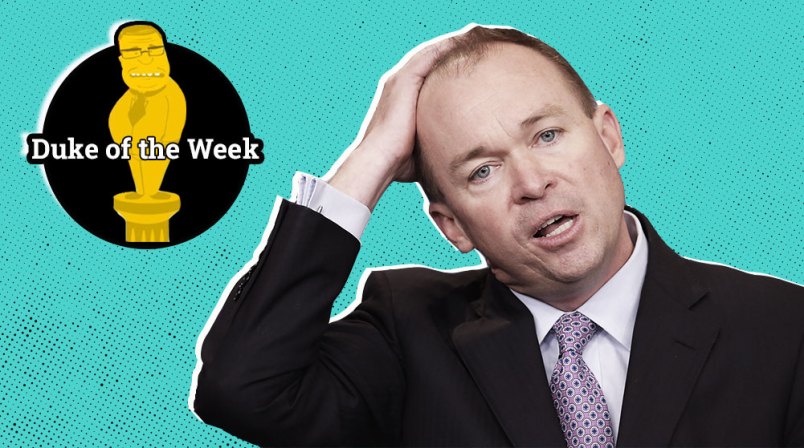“We had a hierarchy in my office in Congress,” Mick Mulvaney, the acting head of an agency that regulates banking told a room full of bankers this week. “If you’re a lobbyist who never gave us money, I didn’t talk to you. If you’re a lobbyist who gave us money, I might talk to you.”
Mulvaney, of course, is the man who is attempting an about-face for the agency he helms, the Consumer Financial Protection Bureau. That includes rebranding the consumer watchdog by scrambling the letters in its name (Mulvaney suggests “BCFP”) and ending its practice of logging consumer complaints.
As a former member of Congress from South Carolina, Mulvaney’s campaigns raised at least half a million dollars from the investment and banking industries, according to the Center for Responsive Politics. He is now overseeing the agency tasked with keeping these same industries in check. The New York Times noted that he received $63,000 from payday lenders alone, an industry that, under Mulvaney’s predecessor Richard Cordray — now a Democratic candidate for the governor of Ohio — the industry cracked down on for its predatory practices. Mulvaney famously called the CFPB a “sick, sad joke” while it was under Cordray’s stewardship.
Following his speech to the American Bankers Association, Mulvaney’s spokesperson claimed that his words had been misinterpreted, noting that Mulvaney also said he would listen to his constituents regardless of whether they donated. His money-talks “hierarchy” only applied to lobbyists.
Nonetheless, his honesty provoked outrage. Some Democrats called for him to step down. “Let’s call it what it is: corruption,” wrote the Washington Post’s ostensibly conservative blogger Jennifer Rubin.
What Mulvaney laid bare, of course, doesn’t even rise to the level of an open secret. Members of Congress can spend up to half their time “dialing for dollars,” soliciting donations like these to fund their reelection efforts. In return, they have to offer something. Usually, that something is access. This is the sort of thing the Supreme Court acknowledged and affirmed with its 2010 Citizens United decision. As election law expert Rick Hasen notes, Justice Kennedy explicitly wrote that “ingratiation and access, in any event, are not corruption.”
So by the Supreme Court’s definition, Mulvaney did not admit to anything corrupt. Mulvaney went further. Lobbyists’ efforts to sway him with donations were, in fact, one of the “fundamental underpinnings of our representative democracy,” he said in his speech. “And you have to continue to do it.”
It may not be corruption. But it also doesn’t seem on message for an administration that promised a fully drained swamp.
For saying the quiet part loud, Mick Mulvaney is our Duke of the Week.



